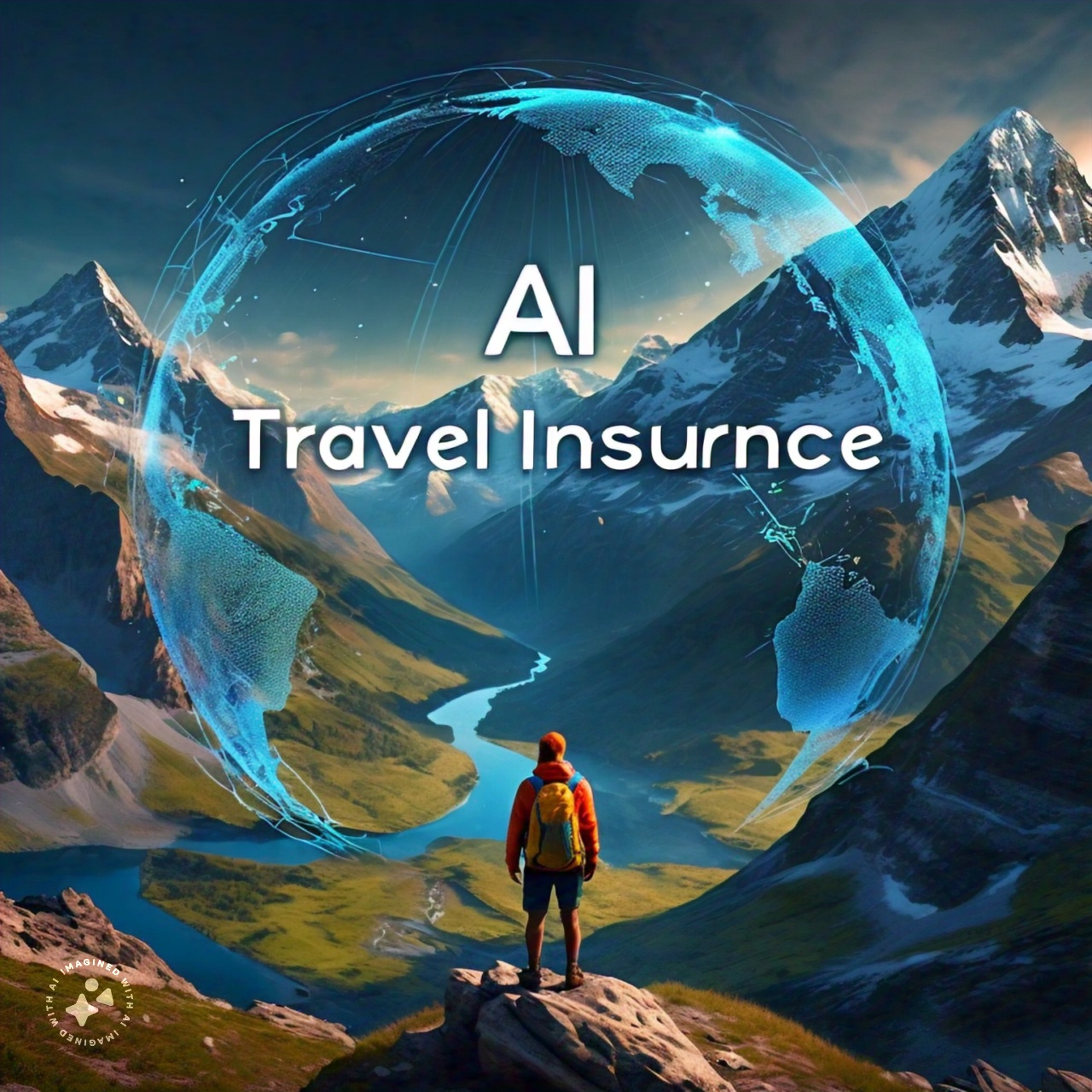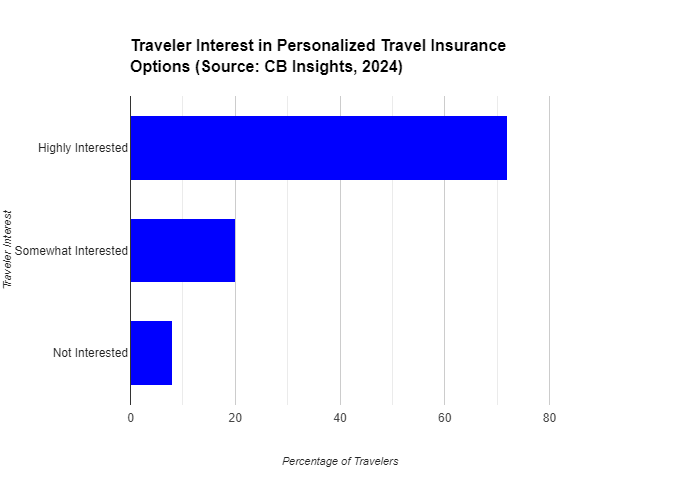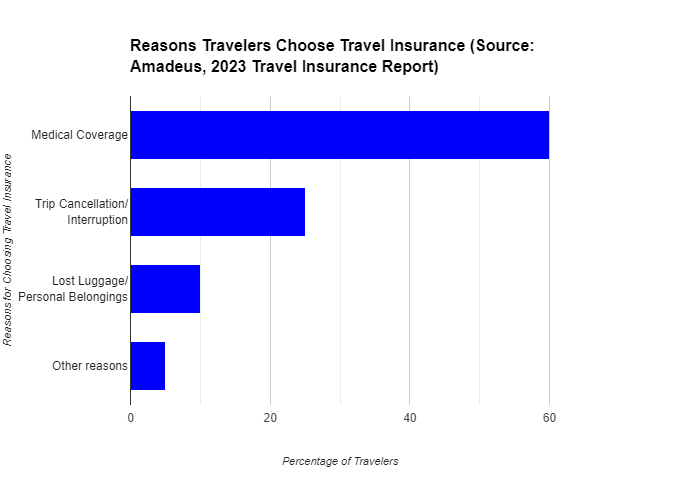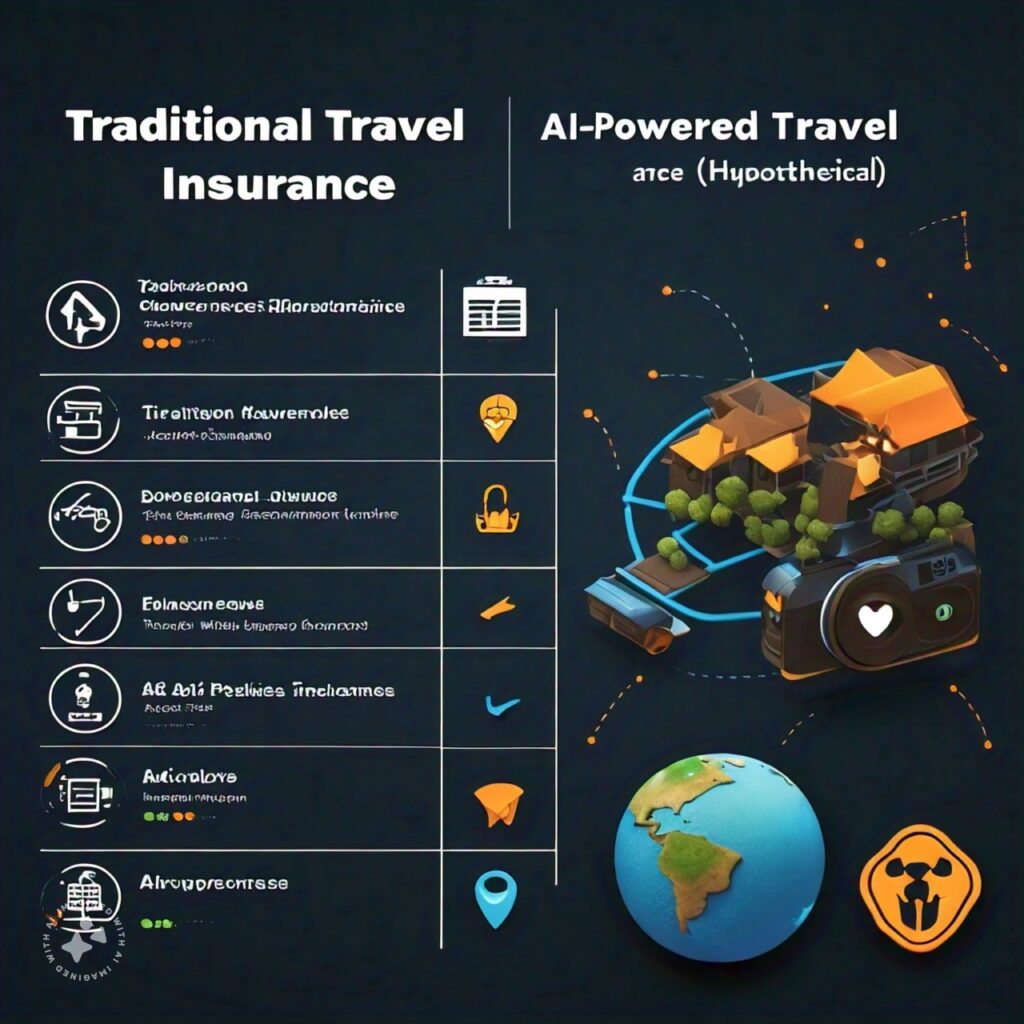
AI Travel Insurance! You're halfway through a dream vacation in Bali, about to conquer that epic surf you've been training for.
Suddenly, a rogue wave sends you tumbling, landing you with a broken arm. Panic sets in – medical bills in a foreign country?
Travel insurance nightmare? But wait! What if AI could transform this scenario into a smooth recovery, thanks to its lightning-fast claims processing and personalized coverage?
 Caption: Peace of mind, wherever you roam: AI Travel Insurance for stress-free adventures.
Caption: Peace of mind, wherever you roam: AI Travel Insurance for stress-free adventures.You're not alone. A recent study by McKinsey & Company suggests that AI has the potential to revolutionize the insurance industry, with a projected value exceeding $1.2 trillion by 2030.
But is AI travel insurance just another industry buzzword, or a genuine game-changer for savvy travelers?
Did you know that a whopping 40% of travelers admit to skipping travel insurance altogether, often due to a complex application process and
confusion over coverage details Allianz Global Assistance? AI has the potential to streamline this process, making travel insurance more accessible and user-friendly.
Picture this: A family excitedly jets off to Europe, only to have their meticulously planned trip thrown into chaos by a flight cancellation.
Trapped at the airport, the parents scramble through mountains of paperwork, desperately trying to navigate their travel insurance policy.
With AI, this scenario could be vastly different. Imagine an AI-powered app instantly analyzing the situation,
providing real-time assistance in rebooking flights and hotels, and ensuring a smooth recovery for the family's vacation.
Benefits of AI-Powered Travel Insurance
FeatureBenefitPersonalized CoverageTailored insurance options based on specific trip details (destination, activities)Faster Claims ProcessingAI streamlines data analysis and potentially expedites reimbursementsProactive AssistanceAI can translate symptoms and connect travelers to medical professionals in emergencies24/7 Customer SupportAI chatbots offer support anytime, with escalation options to human agentsCaption: This table outlines the potential benefits of AI-powered travel insurance, highlighting its ability to personalize coverage, expedite claims processing, and provide proactive assistance and 24/7 customer support.
While the potential benefits of AI travel insurance are undeniable, ethical considerations and data privacy concerns linger.
Are we comfortable with AI algorithms making decisions about our travel safety and financial security?
This article will explore these questions and equip you with the knowledge to make informed choices about your travel insurance needs.
https://www.youtube.com/watch?v=4j3_utwAC5o
Caption: This video by TravelTrendz explores the potential impact of AI on travel insurance, discussing features like personalized coverage, faster claims processing, and 24/7 AI-powered assistance.
The Rise of the Machines (or Helpful Travel Bots?)
The insurance industry is witnessing a fascinating transformation fueled by Artificial Intelligence (AI).
While the term "machines" might conjure images of robots taking over, AI in insurance manifests as sophisticated algorithms designed to improve efficiency,
personalization, and risk management. Let's delve deeper into how AI is changing the game, with a particular focus on travel insurance:
 Caption: Your travel team: AI Travel Insurance with human and AI assistance for a smooth journey.
Caption: Your travel team: AI Travel Insurance with human and AI assistance for a smooth journey.1. Risk Assessment and Personalized Pricing: Tailoring Coverage to Your Travels
Imagine ditching the one-size-fits-all approach to travel insurance. AI can analyze vast amounts of data, including travel destinations, activities,
demographics, and historical claims information Accenture. This allows for a more nuanced risk assessment, leading to:
- Fairer Pricing: Travelers with lower-risk itineraries (think relaxing beach vacations) could see lower premiums compared to those planning adventurous trips (think mountain climbing expeditions). A recent study by PricewaterhouseCoopers suggests that AI-powered risk assessment could lead to a 10-20% reduction in premiums for low-risk travel insurance policies.
- More Relevant Coverage: AI can recommend add-on coverage options tailored to your specific trip. Heading to a ski resort? The AI might suggest adding winter sports coverage. This level of personalization ensures you have the right protection without paying for unnecessary extras.
Traditional vs. AI-Powered Travel Insurance: A Comparison
FeatureTraditional Travel InsuranceHypothetical AI-Powered Travel InsuranceCoverage OptionsOne-size-fits-all policies with limited customizationPersonalized coverage based on travel plans and risk assessmentClaims ProcessingLengthy process often requiring paperwork and phone callsFaster, potentially real-time processing with electronic claim filingCustomer ServiceLimited availability during business hours, potentially long wait times24/7 AI chatbot support with potential for human escalationPremiumsStatic premiums based on broad risk categories (age, destination)Dynamic premiums based on individual risk profiles (travel habits, health conditions)Caption: This table compares traditional travel insurance with hypothetical AI-powered options, showcasing the potential for personalization, faster claims processing, enhanced customer service, and potentially lower premiums based on individual risk profiles.
2. Real-Time Claims Processing: Goodbye Paperwork, Hello Efficiency
Lost your luggage in a bustling airport overseas? Traditionally, filing a travel insurance claim can be a time-consuming ordeal filled with paperwork and phone calls.
AI steps in as a potential game-changer:
- Faster Resolution: AI-powered systems can analyze claim forms and supporting documents electronically, potentially expediting the processing time. A Forbes article highlights that AI can streamline claims processing by up to 70%, allowing you to receive your reimbursement quicker and focus on getting back on track with your trip.
- Fraud Detection: AI algorithms can sift through vast datasets to identify potentially fraudulent claims, protecting both insurers and legitimate travelers. This not only helps keep premiums down but also ensures a more efficient claims process for everyone.
 Caption: This bar chart highlights a growing interest in personalized travel insurance, with over 70% of travelers expressing a desire for coverage tailored to their specific trip details.
Caption: This bar chart highlights a growing interest in personalized travel insurance, with over 70% of travelers expressing a desire for coverage tailored to their specific trip details.3. Chatbots and Virtual Assistants: 24/7 Support at Your Fingertips
No more waiting on hold music! AI-powered chatbots can answer your travel insurance questions anytime, anywhere. These virtual assistants are:
- Always Available: Unlike human agents, chatbots are accessible 24/7, providing immediate assistance regardless of time zone or day of the week.
- Information Powerhouses: Chatbots can be programmed with a vast knowledge base of travel insurance policies, claim procedures, and frequently asked questions, offering quick and accurate answers.
It's important to remember that chatbot technology is still evolving. While they can handle basic inquiries efficiently,
complex issues might still require interaction with a human representative.
4. Tailored Recommendations for Coverage: A Travel Insurance Butler in Your Pocket
Imagine having a personalized travel insurance advisor readily available. AI can analyze your travel plans and
suggest add-on coverage options that truly make sense for your trip:
- Dynamic Recommendations: AI can consider factors like your destination, activities, age, and health conditions to suggest relevant add-on options. For example, if you're traveling to a country with a high risk of mosquito-borne diseases, the AI might recommend adding medical evacuation coverage.
- Proactive Approach: AI can even anticipate potential risks based on your itinerary. Planning a trek through a remote region? The AI might suggest adding emergency travel assistance coverage for peace of mind.
While AI offers exciting possibilities for personalized coverage, it's crucial to remain vigilant.
Double-check any AI-generated recommendations to ensure they align with your specific needs and risk tolerance.
5. Limitations of AI in Insurance: A Work in Progress
The world of AI is still under development, and the application of AI in insurance is no exception. Here are some key limitations to consider:
- Data Bias: AI algorithms are only as good as the data they are trained on. If the data is biased, the AI's decision-making can be skewed. The insurance industry needs to ensure diverse datasets are used to train AI systems and mitigate potential bias in risk assessment and pricing.
- Lack of Transparency: The inner workings of complex AI algorithms can be opaque. This lack of transparency can make it difficult for users to understand how AI arrives at certain decisions, particularly regarding claim denials or risk assessments. The insurance industry should strive for explainable AI models that provide users with a clearer picture of the reasoning behind AI-driven decisions.
- Human Oversight Remains Essential: Despite its advancements, AI shouldn't replace human expertise entirely. Travelers with complex needs or unique situations might still require the personalized guidance of a human insurance agent. The ideal scenario involves AI working alongside human agents to streamline processes and enhance the overall customer experience.
- The Future of AI in Travel Insurance: A Collaborative Approach: The rise of AI in travel insurance presents a fascinating opportunity to personalize coverage, expedite claims processing, and offer 24/7 customer support. However, it's crucial to acknowledge the limitations of AI and ensure responsible development practices are followed. By harnessing the power of AI while maintaining human oversight and transparency, the travel insurance industry can evolve into a more efficient and user-friendly space for globetrotters worldwide.
https://m.youtube.com/watch?v=S1w8oo2aKdw
Caption: While not directly focused on AI, this video by The Finance Bar offers valuable tips for choosing the right travel insurance plan. The information can be helpful when considering traditional travel insurance options versus potentially AI-powered options in the future.
AI Travel Insurance: A Case Study in Paradise (or Potential Peril)?
Imagine this: you're paragliding over the breathtaking landscapes of New Zealand, when a sudden gust of wind throws you off course.
You land safely, but your expensive equipment is a mangled mess. Traditionally, filing a travel insurance claim for damaged gear could take weeks,
leaving you scrambling to replace it and continue your adventure.
 Caption: Unexpected detours? AI Travel Insurance for worry-free adventures and seamless claims.
Caption: Unexpected detours? AI Travel Insurance for worry-free adventures and seamless claims.Enter AI travel insurance, a potential game-changer for scenarios like this. Here's how AI could transform your travel insurance experience:
1. Personalized Coverage Tailored to Your Itinerary:
Forget the generic travel insurance policies of the past. AI can analyze your travel plans in detail, including:
- Destination: Heading to a country with a high risk of mosquito-borne diseases? AI might recommend adding medical evacuation coverage.
- Activities: Planning a daring white-water rafting expedition? The AI could suggest adding adventure sports coverage for added peace of mind. A recent study by CB Insights suggests that 72% of travelers are interested in travel insurance that personalizes coverage based on their specific trip details.
This level of personalization ensures you're not just covered, you're comprehensively covered for the activities you'll actually be doing.
No more paying for unnecessary extras like golf insurance if you're on a backpacking trip through Southeast Asia.
Potential Challenges of AI Travel Insurance
ChallengeDescriptionData Privacy ConcernsTravelers' comfort level with sharing personal data for personalized coverage and potential security breachesEthical ConsiderationsBias in AI algorithms leading to unfair pricing practices (e.g., higher premiums for certain demographics)Human OversightThe importance of human expertise in handling complex situations and ensuring ethical and responsible AI developmentCaption: This table addresses potential challenges surrounding AI travel insurance, including data privacy concerns, potential for ethical bias, and the ongoing need for human oversight to ensure responsible development and address complex situations.
2. Proactive Assistance in Emergencies: Your AI Travel Guardian Angel
Imagine getting sick on a solo trip to a remote village in Thailand. Traditionally, navigating language barriers and
finding the right medical care could be a daunting task. AI travel insurance could offer a lifeline:
- Real-Time Medical Assistance: The AI-powered app could translate symptoms and connect you with nearby qualified medical professionals, ensuring you receive timely and appropriate care. A World Economic Forum report highlights that AI-powered healthcare assistants are being developed to provide remote medical consultations and guidance, potentially revolutionizing travel health assistance.
- Expedited Claims Processing: AI can streamline the claim filing process by analyzing medical bills and receipts electronically. This could significantly reduce processing times and get you the reimbursement you need faster.
 Caption: This stacked bar chart showcases the top reasons travelers choose travel insurance, with medical coverage being the primary concern, followed by trip cancellation and lost luggage protection.
Caption: This stacked bar chart showcases the top reasons travelers choose travel insurance, with medical coverage being the primary concern, followed by trip cancellation and lost luggage protection.3. Faster Claims Processing: Ditch the Paperwork, Embrace Efficiency
Lost your luggage at a chaotic airport in Europe? Traditionally, the claims process could involve mountains of paperwork and endless phone calls. AI offers a potential solution:
- Automated Claim Filing: Imagine an AI-powered app that guides you through the claim filing process step-by-step. The app could automatically gather relevant information from your trip itinerary and receipts, eliminating the need for manual data entry.
- Faster Reimbursements: By streamlining the claims process, AI could significantly reduce processing times. A McKinsey & Company report suggests that AI can automate up to 80% of insurance claims processing tasks, potentially leading to faster reimbursements for travelers.
However, it's important to remember that AI technology is still evolving. While AI travel insurance holds immense promise, it's crucial to be aware of potential limitations (covered in the next section) before you rely solely on AI for your travel safety net.
https://m.youtube.com/watch?v=ccQc7UZW9xc
Caption: This video by Fintech Report explores the potential of AI in travel insurance, discussing features like personalized coverage, faster claims processing, and 24/7 customer support.
An Other Case Study in Paradise
The Promise vs. The Reality: A Look at Traditional vs. AI-Powered Travel Insurance
 Caption: Travel smarter, travel safer: Comparing Traditional vs. AI-Powered Travel Insurance.
Caption: Travel smarter, travel safer: Comparing Traditional vs. AI-Powered Travel Insurance.While AI travel insurance presents exciting possibilities, it's valuable to compare it with traditional options to understand the potential benefits and limitations:
FeatureTraditional Travel InsuranceAI-Powered Travel Insurance (Hypothetical)Coverage OptionsOne-size-fits-all policies with limited customizationPersonalized coverage based on destination, activities, and traveler profile. Options for add-on coverage tailored to specific needs.Claims ProcessingLengthy process often requiring physical paperwork and phone callsFaster, potentially real-time processing with electronic claim filing and automated data analysis (e.g., using receipts and travel itineraries).Customer ServiceLimited availability during business hours, potentially long wait times24/7 AI chatbot support with the ability to escalate complex issues to human representatives.PremiumsStatic premiums based on broad risk categories (age, destination)Dynamic premiums based on individual risk profiles (travel habits, health conditions, activities). Lower premiums possible for low-risk travelers.
It's important to remember that AI-powered travel insurance is still a concept in development. While some companies are piloting AI features, widespread adoption might take some time.
Here are some additional considerations to keep in mind:
- Data Privacy: AI relies on personal data to personalize coverage and assess risk. Travelers should be comfortable with how their data is collected, stored, and used by AI insurance providers. A recent study by Deloitte found that 87% of consumers are concerned about how AI companies use their personal information. Transparency and robust data security practices are crucial for building trust with consumers.
- Limited Transparency: The inner workings of AI algorithms can be complex.
https://justoborn.com/travel-insurance/
No comments:
Post a Comment